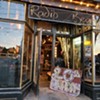click to enlarge 
- Dreamstime.com/ Brad Calkins
Many years ago, three Berkeley professors gave me an oral examination for a doctorate in comparative literature. When I mentioned that a certain text was "centered around" a theme, one of the profs — a well-known critical theory maven and quasi-performance artist — made a sour face. "It's centered
on," she said. "I'm sorry, but people make that mistake so often. You can't center something
around anything, because the center is in the center."
I've avoided the phrase "centered around" ever since — and, frankly, that may be the most useful instruction the professor ever gave me. I think of it every time I edit a story where the writer uses the equally baffling — and strangely popular — phrase
"based around."
This is not an easy phrase to search in our archives — plus, I want to retain my delusion that I can ban it forever from the paper and virtual pages of
Seven Days. So here are a few made-up examples:
The movie Paper Towns is based around the novel by John Green.
My ideal religion would be based around the ritual consumption of local cheese.
And a few titles/headlines from the web:
YouTube Launches Trio of Projects Based Around Eyewitness Journalism
5 Movies Based Around High School Experiences
Wallabies Develop Written Manifesto Based Around Wanting to be a Team That Excites Australia
Clearly this usage is popular, in print as well as in speech. (I even found it in titles of technical papers.) So what makes it "wrong"?
Visualize the "base" of an object — say, a building. Where is it in relation to the rest of the building? Underneath. A skyscraper is built
on a foundation. A superstructure is built
on a base. If the superstructure were "around" the base, the base would not be supporting it, and the base would not
be a base. It would be a centerpiece of some sort.
So the correct phrase to use in all these examples is "
base(d) on." Or, if you really want to emphasize the structure's complex and sprawling quality, as you might in the case of the cheese-eating religion, I would use
"structured around."
Are there times when "based around" makes sense and could be considered correct? Sure.
The Roman garrison was based around the walled city.
(Meaning: The soldiers formed a ring surrounding the city. The city itself, however, is not their base. If it were, you would say, "The garrison was based in Alexandria.")
In his work with IBM, he has been based around the country.
(Meaning: He has worked at offices in several different parts of the country.)
So just remember, something that is "around" a solid base can't be supported by it.
And please don't substitute "
based off of." Your object is not taking off from your base like a rocket. It's resting on it — or, again, you don't have a stable structure.
Why do people use these constructions instead of the short, easy, obvious "based on"? I think it's partly misplaced creativity, partly an example of the
preposition creep I wrote about earlier. We often feel like more or longer prepositions must be better, when in fact they add nothing (or, in this case, make our phrasing sound clumsy).
Or perhaps there's a deeper, more timely motive: These days, we don't like to imagine every complex cultural structure as a skyscraper (a hegemonic,
phallic skyscraper, my professor would no doubt say).
In today's culture, the superstructure that arises from a particular influential source (such as the multimedia Marvel universe from a bunch of comic books) is likely to grow in all directions and across different media, like a jungle or a ramshackle slum. There's nothing linear or orderly about it. We don't imagine
Harry Potter fanfiction developing in a straightforward way from J.K. Rowling's books, but rather, growing like unruly kudzu around them.
So maybe we need a term other than "based on" to describe the nonlinear, nonhierarchical relationship that a phenomenon such as
Harry Potter fanfiction or Tex-Mex cuisine maintains with its source(s). But that term is not "based around," which suggests an orderly ring around a central monolith.
The best term probably wouldn't use the word "base" at all. I'm open to suggestions.
I'll leave you with this
CBS story about two men after my own heart: the Henderson brothers. While Bryan has devoted his life to ridding Wikipedia of misuses of the phrase "comprised of," his brother Robin feels equally strongly about "based around" and "spends a couple hours a week on Wikipedia changing 'based around,' usually to 'based on.'" Thank you, friends, for your unsung, painstaking toil.
Finally, for anyone who wants to take me to task for the ungrammatical title of this post,
here's the explanation.
















































